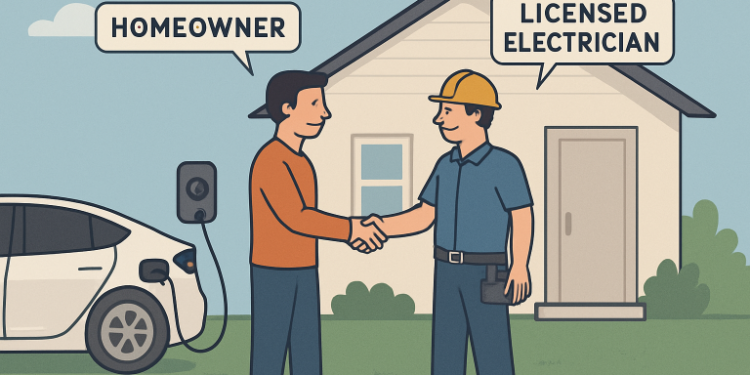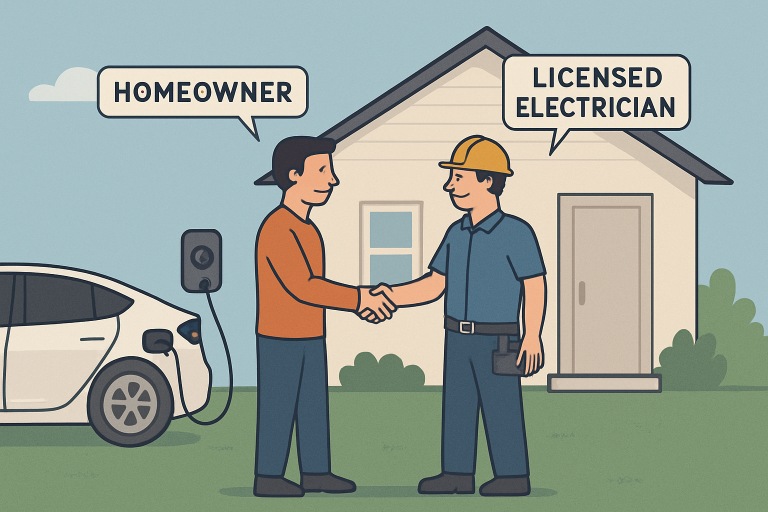Tips for Choosing an EV Charger Installer

Home EV charging is a major convenience for electric vehicle owners, transforming daily routines and offering significant long-term benefits. However, choosing a qualified EV charger installer is critical for ensuring safety, code compliance, and optimal system performance. As you embark on this process, you’ll want to make careful, informed decisions for peace of mind now and in the future. If you live in North Carolina, there is Raleigh, NC EV charging station installation by licensed electricians, providing top-tier service and reliability.
Professional expertise becomes especially important due to the technical complexities and regulatory aspects of EV charger installation. Cutting corners or selecting the wrong provider can result in costly mistakes, safety hazards, or headaches with code enforcement.
Table of Contents
- 1 Verify Licensing and Certifications
- 2 Assess Experience with EV Installations
- 3 Request Transparent Pricing
- 4 Confirm Knowledge of Local Codes and Permits
- 5 Inquire About Post-Installation Support
- 6 Evaluate Customer Reviews and References
- 7 Consider Energy Incentives and Rebates
- 8 Ask the Right Questions
- 9 Final Thoughts
Verify Licensing and Certifications
The installer’s credentials should always be your first checkpoint. An electrical contractor’s license is a non-negotiable requirement, protecting homeowners and ensuring that work meets regulatory standards. Look for additional certifications, such as those from the Electric Vehicle Infrastructure Training Program (EVITP) or manufacturer-specific training, like Tesla or ChargePoint. These additional qualifications signal an installer’s investment in professional knowledge and safety practices. According to the U.S. Department of Energy, certified professionals help guarantee safety and compliance throughout installation.
Assess Experience with EV Installations
Experience is just as vital as licensure. A contractor regularly installing EV chargers will be comfortable with the process—from calculating load and evaluating panel capacity to managing code-compliant wiring. This minimizes installation risks and ensures both efficiency and reliability. The nuances of integrating a charger with your home’s existing power system require a specialized understanding that not all electricians possess. Always ask how many EV chargers the company has installed and if they are familiar with your specific vehicle or charging equipment.
Request Transparent Pricing
Detailed, upfront pricing helps you avoid surprises and compare providers with confidence. Your installer should provide an itemized quote covering materials, labor, permit fees, and any optional upgrades (such as panel improvements or trenching for outdoor installations). Beware of vague estimates—clear breakdowns are the hallmark of a reputable professional and help you budget accurately for your project.
Confirm Knowledge of Local Codes and Permits
Electrical systems are regulated tightly at the local, state, and federal levels. Your installer should manage the full permitting process, ensuring the project aligns with regional electrical codes. This protects you from issues down the road during home sales, insurance reviews, or city inspections. Familiarity with the National Electrical Code (NEC 625) is a must for any qualified installer, as well as an understanding of Raleigh’s specific permitting procedures and safety requirements.

Inquire About Post-Installation Support
After your charger installation, you may encounter technical questions or require future maintenance. Reliable installers provide post-installation warranties covering both equipment and labor. They should also be readily available for troubleshooting or repairs. Asking about these support policies up front is essential, ensuring your investment is protected for years to come. Trustworthy contractors will clearly outline what is included in your post-installation support, helping you avoid out-of-pocket repairs for issues related to their work.
Evaluate Customer Reviews and References
A strong reputation is one of the best indicators of reliable service. Research online reviews on Google, Yelp, and third-party trade platforms. Pay attention to feedback on punctuality, quality of workmanship, communication, and responsiveness. Don’t hesitate to request direct references—especially for installations like yours. Consistently positive ratings suggest you’re dealing with a company that values quality and customer satisfaction.
Consider Energy Incentives and Rebates
Many homeowners can save on installation costs by leveraging federal tax credits and local utility rebates. A knowledgeable installer will help you identify and apply for available incentives, maximizing your return on investment. For example, the Inflation Reduction Act extends EV charger tax credits through 2032, offering a substantial financial benefit. Details and step-by-step guidance are provided by both the Consumer Reports guide to home charging and local government resources.
Ask the Right Questions
Before authorizing work, interview prospective installers. Consider asking:
- Are you licensed, bonded, and insured specifically for EV charging work?
- How many home EV charger installations have you completed?
- Will you handle all required permits and post-installation inspections?
- Can you provide a full breakdown of your pricing and potential additional costs?
- What warranty and ongoing support do you offer after installation?
Clear, confident answers assure the installer’s qualifications, transparency, and customer commitment.
Final Thoughts
Reliable EV charger installation is crucial for safety, convenience, and compliance. By verifying credentials, reviewing experience, insisting on transparency, and leveraging applicable incentives, you set the groundwork for years of worry-free home charging. Take time to assess your options, ask detailed questions, and ensure your installer is up to powering your journey toward a cleaner, more efficient future.

